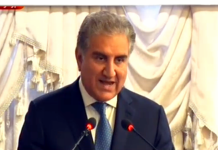Published on: August 30, 2025 2:57 AM
 Punjab Provincial Disaster Management Authority (PDMA) Director General Irfan Ali Kathia Friday said that Lahore is now “completely safe”.
Punjab Provincial Disaster Management Authority (PDMA) Director General Irfan Ali Kathia Friday said that Lahore is now “completely safe”.
Speaking to a private TV channel, he said: “The situation in Shahdara is far less dangerous, as the water has gradually receded,” he said. “The 220,000 cusecs we recorded moving through the area last night has fallen to 161,000 cusecs.”
He added that water levels at the Ravi Syphon and Jassar have fallen.
“However, this water is now causing the levels to rise quickly at Balloki,” Kathia highlighted. “At Nullah Dek in Nakana, 15,000 to 20,000 additional cusecs of water are already in this system.
Earlier, the PDMA said in a statement that it will need to breach an embankment on the Sutlej River in order to protect Kasur from severe flooding.
“Increased water flow from India means that water in the Sutlej is rushing towards Kasur,” Irfan Ali Kathia was quoted as saying. “We are forced to breach the Rahimyar embankment in order to save Kasur.”
High flooding in Ravi, Chenab and Satlej rivers has claimed 28 lives while ready crops have been damaged across Punjab following excessive dischage of water from India.
The Sutlej River at Ganda Singh Wala has been undergoing high level flood where water flow has surged past 350,000 cusecs – the heaviest recorded since 1955.
The situation may worsen as more rainfall and potential water releases from India threaten to increase the volume of water in the river. Authorities in Kasur and adjoining districts have been placed on high alert, while evacuations from vulnerable settlements are underway.
Meanwhile, Prime Minister Shehbaz Sharif said on Friday that a comprehensive strategy is being developed to build water reservoirs and improve water management across all four provinces, as well as in Azad Jammu and Kashmir (AJK) and Gilgit Baltistan (GB).
His remarks came as Pakistan is battling torrential monsoon rains that have unleashed flash floods, swelled rivers, and filled dams, with more than 840 deaths reported since late June. Amid the heavy rains, India released excess water this week from its dams, swelling river flows downstream in Punjab.
In a statement issued by the Prime Minister’s Office, the premier said that water reservoirs would be built through consultation and complete coordination with the provinces.
He said: “Climate change is a reality, and only through effective preparedness can the damages of natural disasters be minimised.”
The PM further underlined that all provinces, AJK, GB and the federation must work together to safeguard people from the adverse impacts of climate change, terming it a national issue that requires collective effort.
Work is already underway on his directives to formulate an effective policy for timely response to the impacts of climate change and the monsoon, read the statement.
“The working paper of this policy will be shared with all provincial governments to devise a joint course of action,” it added.
Moreover, PM Shehbaz Sharif on Friday received a telephone call from President of the Islamic Republic of Iran, Dr Masoud Pezeshkian, who conveyed his condolences and solidarity with the people of Pakistan over the devastation caused by ongoing floods in various parts of the country.
Expressing sympathy with the bereaved families who have lost loved ones and property in the calamity, President Pezeshkian assured that Iran stood by Pakistan in this difficult time and offered any assistance his country could extend to the flood-affected population.
The prime minister thanked President Pezeshkian for his thoughtful gesture and Iran’s expression of support, terming it a reflection of the deep fraternal ties between the two nations. He also requested that his warm regards and good wishes be conveyed to the Supreme Leader Ayatullah Ali Khamenei.
Both leaders reaffirmed their commitment to further strengthening bilateral relations and expressed keen anticipation of their interaction at the upcoming SCO Summit in Tianjin, China.
The Asian Development Bank (ADB) will provide a $3 million grant to Pakistan from the Asia Pacific Disaster Response Fund to support emergency flood relief efforts in the country, according to a ADB statement on Friday.
“Asian Development Bank President Masato Kanda extended condolences for the lives lost and individuals affected by the widespread monsoon rains and floods in Pakistan. Demonstrating ADB’s rapid response capability, Mr Kanda announced that ADB will provide, upon request of the Government of Pakistan, a $3 million grant from the Asia Pacific Disaster Response Fund to support emergency relief efforts,” the statement read.
“Pakistan is experiencing devastating flooding that has displaced families and communities, and ADB stands firmly with Pakistan during this crisis,” said Kanda.
“When disasters strike, we respond quickly to help communities rebuild with dignity. This emergency support reflects our enduring commitment to Pakistan’s people through both immediate humanitarian needs and long-term development.”
Separately, Chief Minister Punjab Maryam Nawaz Sharif visited Sialkot and Wazirabad to personally assess the flood situation. She reached Sohdra area of Wazirabad to review the flood situation. She visited the flood relief camp set up at Sohdra School. She sat among the flood victims. She expressed her heartfelt condolences to the parents of the children who were drowned in the flood and consoled her mother. She also consoled the father of a 22-year-old boy named Chand.
On the direction of Chief Minister Punjab Maryam Nawaz Sharif, water drainage process of Kartarpur Gurdwara was completed in a few hours. All parts of Kartarpur Janm Asthan were completely cleaned. On the direction of Chief Minister Maryam Nawaz Sharif, the workers of ‘Suthra’ Punjab and other officials worked day and night to make every nook and corner of the Gurdwara including Darshan Deore were made spick and span.
Separately, the NDMA has warned that flooded areas in Punjab’s Gujranwala, Gujrat and Lahore districts could experience heavy rainfall over the next 12-18 hours.
“These rains could further worsen the current flood situation, as unusually high water flow persists in the Sutlej, Ravi and Chenab rivers,” the authority wrote in a post on X.







